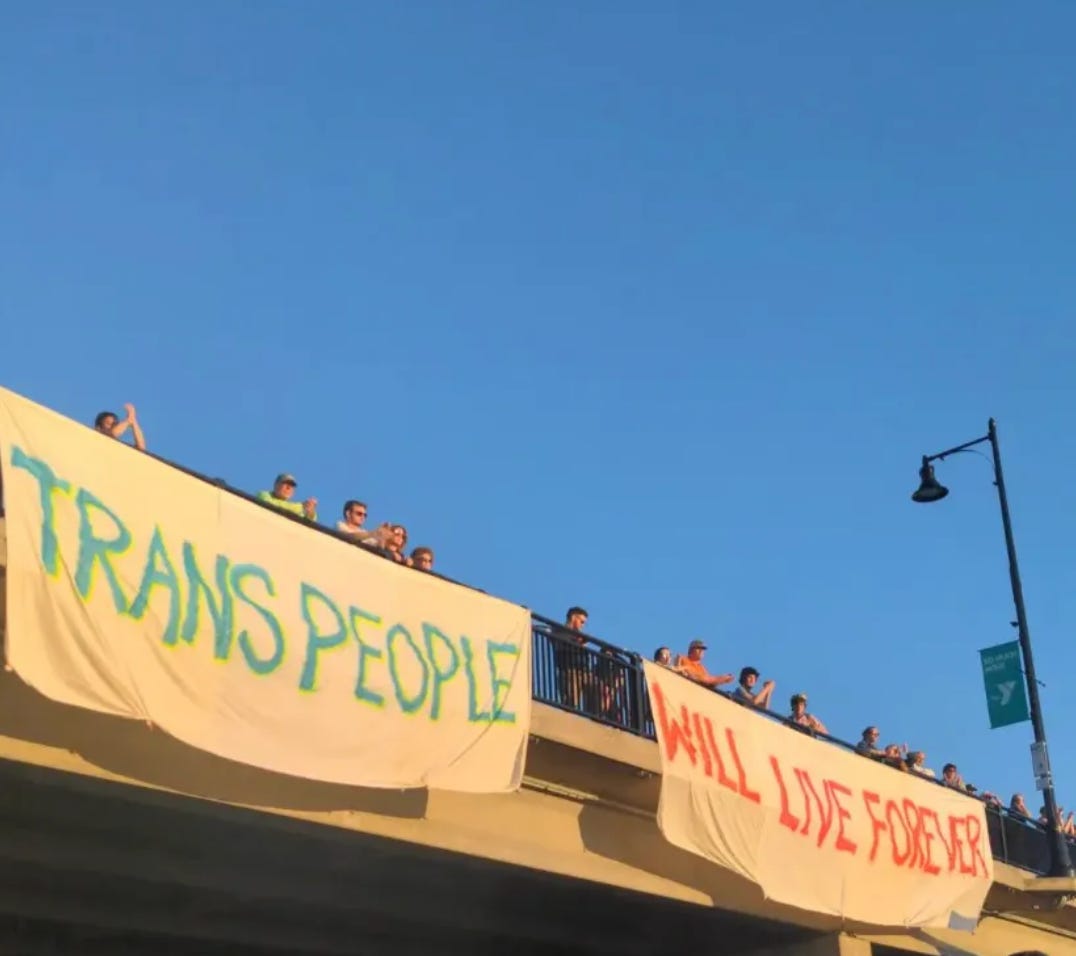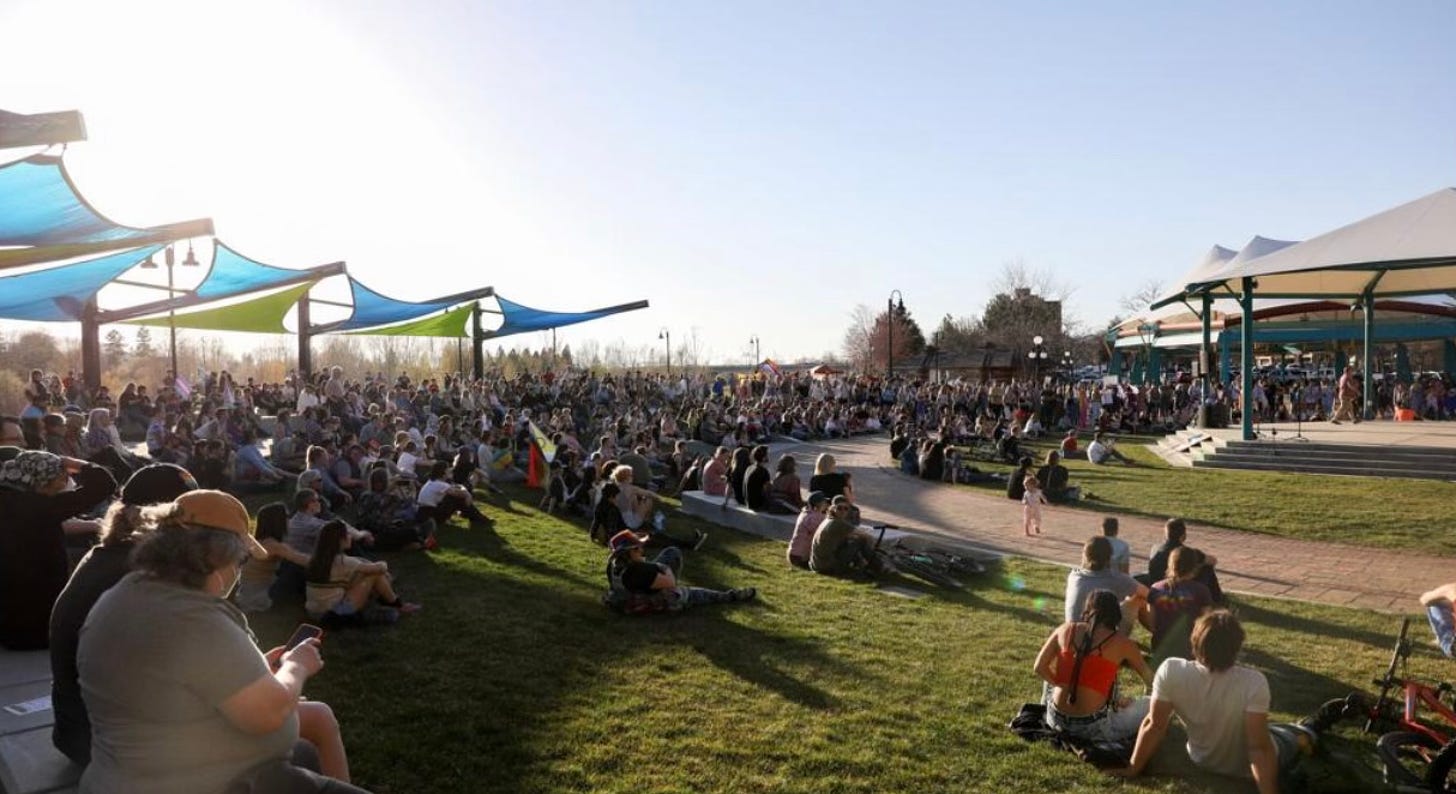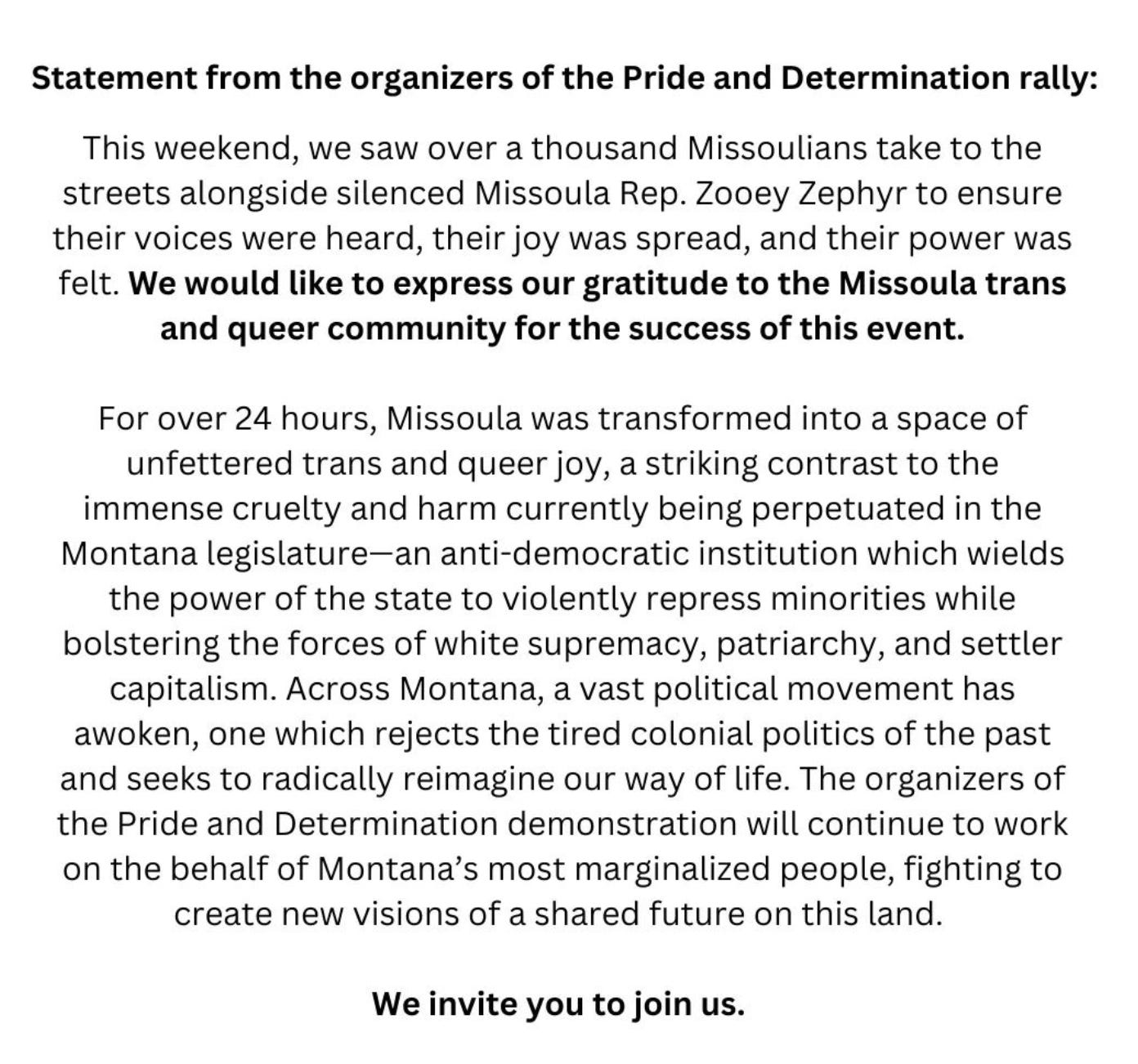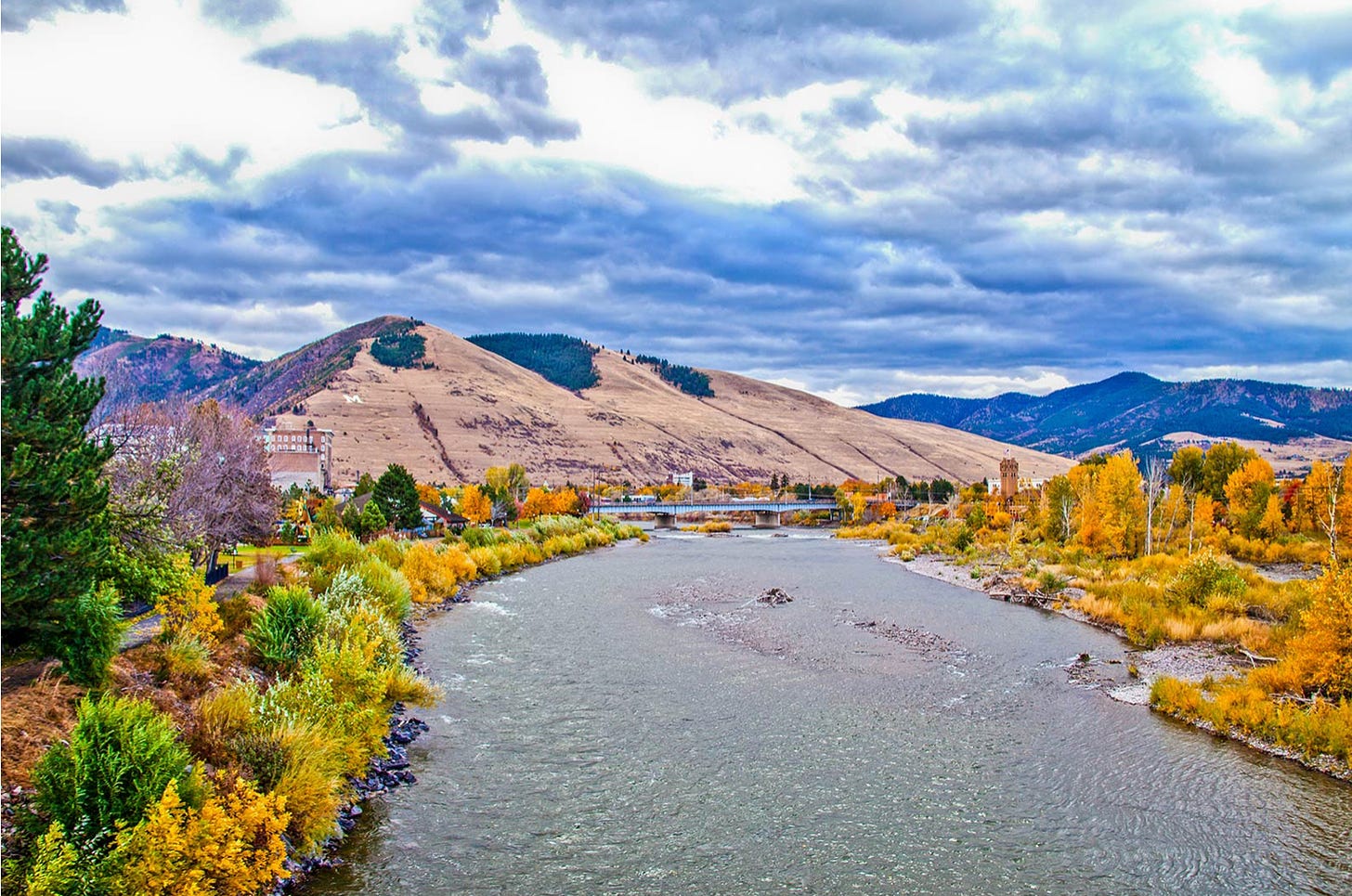Loving you (out loud, in public, all the time) is a form of resistance
It's also our best way out of this mess

Top notes:
This essay is best understood as a companion to the two that I published last week, about the importance of joy in political movements as well as the current situation in my home state of Montana.
If you want to show love and appreciation for the organizers who I highlight below, please consider sending them a donation! As it turns out, putting together a multi-day street festival in order to catalyze a long-term organizing effort costs money.
Do you know what else requires money to operate sustainably ? A newsletter about social change! Thanks, as always, for considering supporting The White Pages and joining our (very fun and supportive) subscribers’ community.
The White Pages… it may not be your favorite weekly email, but I can guarantee it’s the one you’re reading right now.
Politics is terrible.
It is the third rail that ruins family gatherings, fills our airwaves with patronizing attack ads, and demands all of our attention all of the time while offering little material benefit in exchange.
Politics is the cruel alchemy by which our hopes for a better world are transformed— through the addition of money, ego and the crushing weight of our society’s existing power structures— into policies that only ever seem to help folks who are already at the top.
Politics is the uniquely soul-crushing feeling of hearing that something you treasure— your voting rights, your access to healthcare, your basic civil liberties— have been taken away by a lawmaker who will later go on TV and call you any number of dehumanizing names: communist, groomer, baby killer, thug.
Politics is the somehow even more soul-crushing feeling of waking up the next morning— after the worst possible legislation has passed— and receiving an email from the political party that you had counted on to put up a fight assuring you that they too are outraged but could you please send them a quick $5.00 a month?
Politics is designed to be terrible. It is designed to make us feel like the only victories we can hope for are moderate or pyrrhic. A representational win here. A slightly better tax credit there. An embarrassing viral gaffe from somebody on the other side of the aisle.
If being on the receiving end of all this makes you feel powerless and alone, that’s not your fault. Of course you feel like there’s nothing you can do— that voting doesn’t make a difference, that lawmakers are un-influenceable, and that even if you and your buddies were to hold the biggest protest your state has ever seen, the lobbyists would just wait until all the placards were swept up to do their dirty work the following day.
It feels hopeless, because there is so much riding on it feeling hopeless.
Sometimes, though, the truth peaks through all of the deliberate obfuscation.
It actually isn’t all that complicated.
We don’t have to wait for anybody to save us.
Building a better world doesn’t actually require any skills that we don’t already possess.
I have many hometowns, but the one that will always hold the largest piece of my heart is Missoula, Montana. If you’ve ever been to Missoula, you’ve probably seen Caras Park. It’s our town’s default gathering place. There’s a little amphitheater where I must have seen a hundred local bands perform at various free summer concert series. My friends and I would buy some cheap noodles and a Coke and watch the same old hippie dancers do the same twirling, acid-fried dances. It was one of those reassuring inevitabilities that makes a place home. Missoula could and would change, but there’d always be Caras Park, with the cars on Higgins rumbling overhead and its views of the Clark Fork and Hellgate Canyon and, no matter what, at least one White person twirling in a vaguely Guatemalan skirt at all times.
I didn’t normally come home during spring break in college. During my senior year, though, my family had some extra frequent flyer miles and I had a thesis to finish, so I flew home and holed up in my childhood bedroom to write. Midway through the week, the U.S. declared war on Iraq. It was my first taste of absolute political hopelessness. I truly thought that we— the earnest protest movement that I had been a part of— could have stopped that war. What a heartbreakingly naive hope to hold in a war-making country. I sat in my bedroom with NPR on and heard that the stock market had hit a record high after the tanks started rolling into Baghdad. I collapsed into tears.
I felt alone. I felt guilty. I felt powerless.
But because I was home, in Missoula, I had somewhere to go.
I went down to Caras Park on instinct. There was, of course, a protest. As soon as I arrived, I ran into some of my friends, which was lovely, and so many of my parent’s friends, which was even lovelier. I needed elders that day. I needed reminders that I was part of an intergenerational story, and that I wasn’t the end of that story. The gathering wasn’t massive, but we formed a circle and I stared at comfortingly familiar faces. After a while, I turned to look at the Clark Fork. The river was powerful that afternoon; it was flowing with the full force of a big spring thaw. Before long, I felt capable of waking up the next morning and continuing the work. I was not alone. I was cared for. I had a home.
This past weekend, over a thousand Missoulians converged on Caras Park. It was a protest, sort of. More than that, it was a celebration. There’s a reason why it happened there, at a place that has long made Missoulians feel at home, rather than at a state capitol building, which is currently being guarded like a feudal castle. The convergence was coordinated (in 48 hours no less) by young queer organizers in response to Rep. Zooey Zephyr’s banishment from the Montana House of Representatives. It’s worth reading their own words as to the kind of event that they created on the banks of the Clark Fork River.
That sounds lovely because, by all accounts, it was. This past weekend, the streets of Missoula were packed with music and art and warm embraces. There were queer and trans people, as well as cis and straight people who love queer and trans people. Together, they filled the entire valley with a joy palpable enough that homesick expats like myself could feel it thousands of miles away. It was ebullient and hope-giving, but it wasn't magic. The organizers who made it happen worked tirelessly, but they weren't superhuman. It was a hope-giving event because that’s specifically what it was designed to be.
Pointedly, the event did not answer the question of "what can be done in the near term about the legislature?” not because that question doesn’t matter, but because you don’t actually build a different politics by skipping immediately to that step. A movement can’t disrupt calcified power structures if it doesn’t first make the people harmed by those power structures feel loved and connected. We can build a great deal with a strong community, but very little with a diasporic collection of wounded individuals.
Politics is often terrible, but that’s because we forget that it actually begins with a riverside festival that makes a community under siege feel loved, supported and powerful. It actually begins with step that any of us are capable of taking, even if that step feels new and scary.
Yesterday, Representative Zephyr officially sued the Montana Republican leadership in protest of her removal from the House chambers. Joining her suit were four co-plaintiffs, all of them constituents from her 100th House District. One of those four co-plaintiffs was my sister, Anna.
One thing you need to know about my sister is that, while she (like all my siblings) has to tolerate me always sounding off about politics, that’s not her world. She’s not an activist. She’s definitely never been a professional political operative. Like so many of us, Anna is an incredibly busy parent for whom “politics” often feels distant, uninspiring and impenetrable. She is not in the habit of joining State Representatives in suing Republican legislative supermajorities. Quite frankly, so much of this— the media attention, the polished statements, the inevitable trolls in the comments— feels really scary to her.
This weekend, though, she was given an opportunity to join the lawsuit. And she immediately said yes. She did so even though this wasn't the plan for her or her family. It was a new step.
And yet, there was no question as to whether or not she’d say yes. My sister loves her trans kid with all of her heart. She was given an opportunity to share and express that love publicly, and in doing so, perhaps make other trans families feel less alone. Of course she said yes.
For the past twenty four hours, I’ve gotten to play the role of immensely proud big brother, telling folks near and far about the lawsuit. As I’ve done so, I’ve gotten a glimpse of the impact that my sister and my nibling’s simple decision to share their story out loud has had on others. I’ve heard from Missoulians who appreciate that they stood with Zooey. I’ve heard from other moms of trans kids who were touched by my sister’s testimony. I’ve heard queer friends express how beautiful it was to see examples of loving families in public.
The myth that politics is complicated— that it’s a game of high paid experts who know their way around a labyrinthine maze that the rest of us could never hope to traverse— is one of the many obfuscations designed to make us feel powerless.
If that’s what politics is, then we’ll be stuck in this mess forever.
But what if politics was the act of paying attention to which of your neighbors were under attack and figuring out how to make them feel less alone? What if it was about identifying the parts of your life where you’re most vulnerable and asking for help? What if it was mom and dads saying, “Today, I’m going to do something scary if it makes both my kids and other people’s kids feel loved?” What if it was a town saying, together, “To hell with our legislature. We’re going to hold each other so hard and so loudly and so publicly that the sound of our joy will echo off the mountains?”
The counter-point, I supposes, is that we can do all of those things and power will still be held in a small number of cruel hands. We won’t have created a revolution. We won’t have prevented harm.
But here’s the thing.
The reason why both I and other Missoulians feel drawn to Caras Park whenever we’re feeling hopeless isn’t just because it’s downtown or because there’s a stage and a sound system. It’s because it’s next to a river.
You know what’s special about rivers? No matter how hopeless or alone we feel, rivers always offer the same two gifts: the gift of connection and the gift of forward motion. They are a reminder to not become overwhelmed by the fact that we haven’t reached our destination yet. That’s what the purveyors of hate and power and politics-as-it-is want us to feel. What matters, though, is that we are never alone. What matters is that currents do move downstream, even when we feel like we’re standing still. What matters is that we can and will arrive safely, as long as we hold each other tight.
End Notes:
Song of the week:
Would you like to hear a dance remix of Montana House Speaker Matt Regier attempting to kick peaceful protestors out of the gallery? What if I told you that it absolutely slaps? “Come 2 Order” by JK Brenneman.
Also, paid subscribers: Have no fear! While we had to move last week’s discussion (our semi-regular “recommend literally anything” thread) as well as our first ever White Pages poll (the Most Annoying Corporation Award), both will be in your inboxes tomorrow!







"What if politics was the act of paying attention to which of your neighbors were under attack and figuring out how to make them feel less alone? What if it was about identifying the parts of your life where you’re most vulnerable and asking for help?" Keep going, Garrett ... I think many, many of us need constant reminders of this.
Oof, Garrett. I had to pause a few times because this piece made me cry (in a good way). Thank you for writing this. I have a lot of stories in my head about the mountain west because of my time in Colorado, and it is healing to read things that counter those narratives. Queer people everywhere deserve joy and community, and knowing what queer and trans organizers are doing for each other in Missoula makes it easier to continue facing the ongoing violence against us across the country.